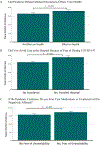The COVID-19 pandemic's impact on worry and medical disruptions reported by individuals with chromosome 22q11.2 copy number variants and their caregivers
- PMID: 35191118
- PMCID: PMC9725107
- DOI: 10.1111/jir.12918
The COVID-19 pandemic's impact on worry and medical disruptions reported by individuals with chromosome 22q11.2 copy number variants and their caregivers
Abstract
Background: The world has suffered immeasurably during the COVID-19 pandemic. Increased distress and mental and medical health concerns are collateral consequences to the disease itself. The Genes to Mental Health (G2MH) Network consortium sought to understand how individuals affected by the rare copy number variations of 22q11.2 deletion and duplication syndrome, associated with neurodevelopmental/neuropsychiatric conditions, were coping. The article focuses on worry and disruptions in medical care caused by the pandemic.
Methods: The University of Pennsylvania COVID-19 Stressor List and care disruption questions were circulated by 22 advocacy groups in English and 11 other languages.
Results: A total of 512 people from 23 countries completed the survey; most were caregivers of affected individuals. Worry about family members acquiring COVID-19 had the highest average endorsed worry, whilst currently having COVID-19 had the lowest rated worry. Total COVID-19 worries were higher in individuals completing the survey towards the end of the study (later pandemic wave); 36% (n = 186) of the sample reported a significant effect on health due to care interruption during the pandemic; 44% of individuals (n = 111) receiving care for their genetic syndrome in a hospital setting reported delaying appointments due to COVID-19 fears; 12% (n = 59) of the sample reported disruptions to treatments; and of those reporting no current disruptions, 59% (n = 269) worried about future disruptions if the pandemic continued. Higher levels of care disruptions were related to higher COVID-19 worries (Ps < 0.005). Minimal differences by respondent type or copy number variation type emerged.
Conclusions: Widespread medical care disruptions and pandemic-related worries were reported by individuals with 22q11.2 syndrome and their family members. Reported worries were broadly consistent with research results from prior reports in the general population. The long-term effects of COVID-19 worries, interruptions to care and hospital avoidance require further study.
Keywords: 22q11.2 deletion syndrome; 22q11.2 duplication syndrome; COVID-19; copy number variations (CNVs); neurodevelopmental psychiatric disorders (NPDs).
© 2022 MENCAP and International Association of the Scientific Study of Intellectual and Developmental Disabilities and John Wiley & Sons Ltd.
Conflict of interest statement
Figures


References
-
- Blagojevic C, Heung T, Theriault M, Tomita-Mitchell A, Chakraborty P, Kernohan K, Bulman DE, et al. (2021), “Estimate of the contemporary live-birth prevalence of recurrent 22q11.2 deletions: a cross-sectional analysis from population-based newborn screening”, CMAJ Open, Vol. 9 No. 3, pp. E802–E809. - PMC - PubMed
Publication types
MeSH terms
Grants and funding
LinkOut - more resources
Full Text Sources
Medical

